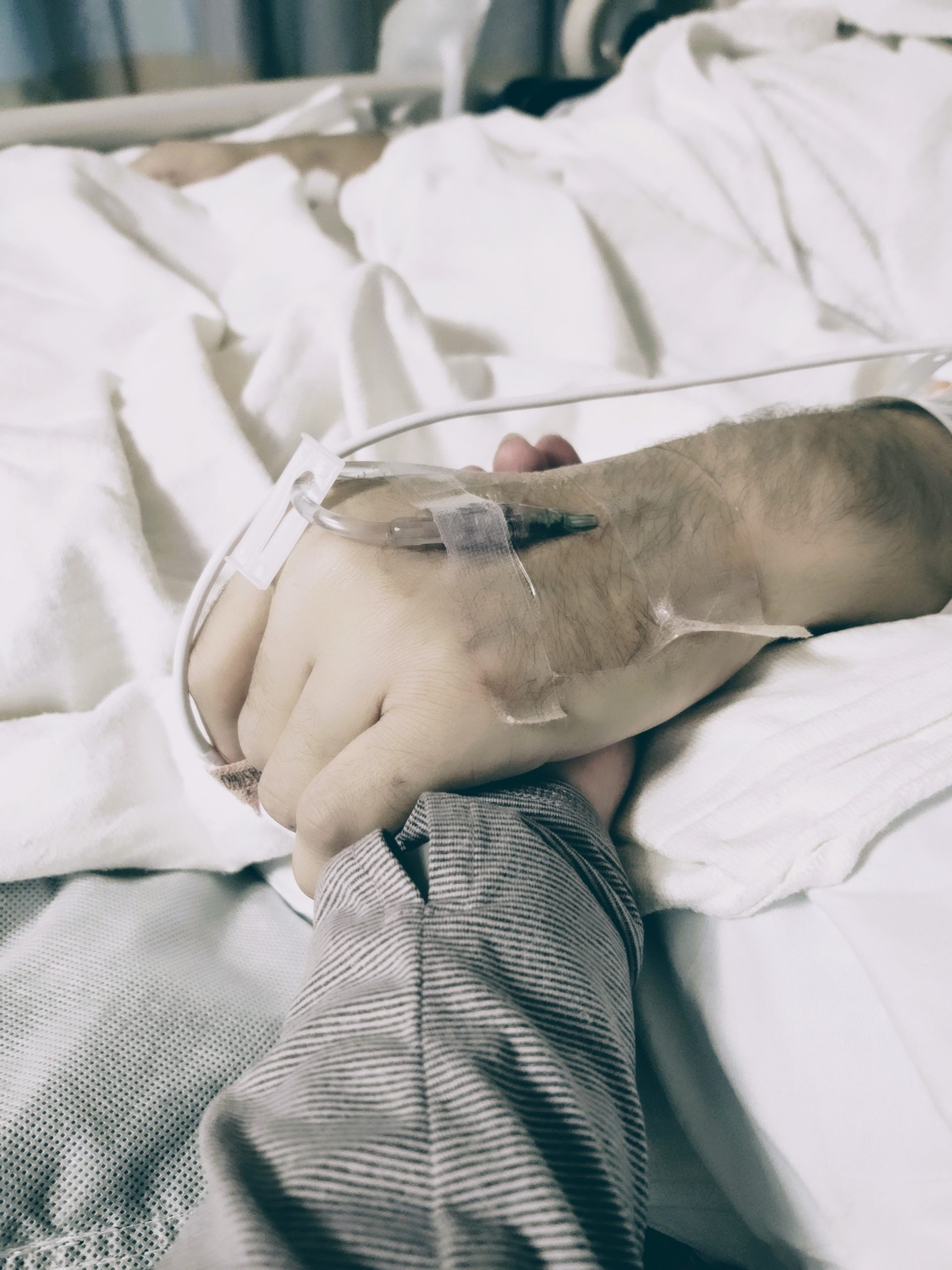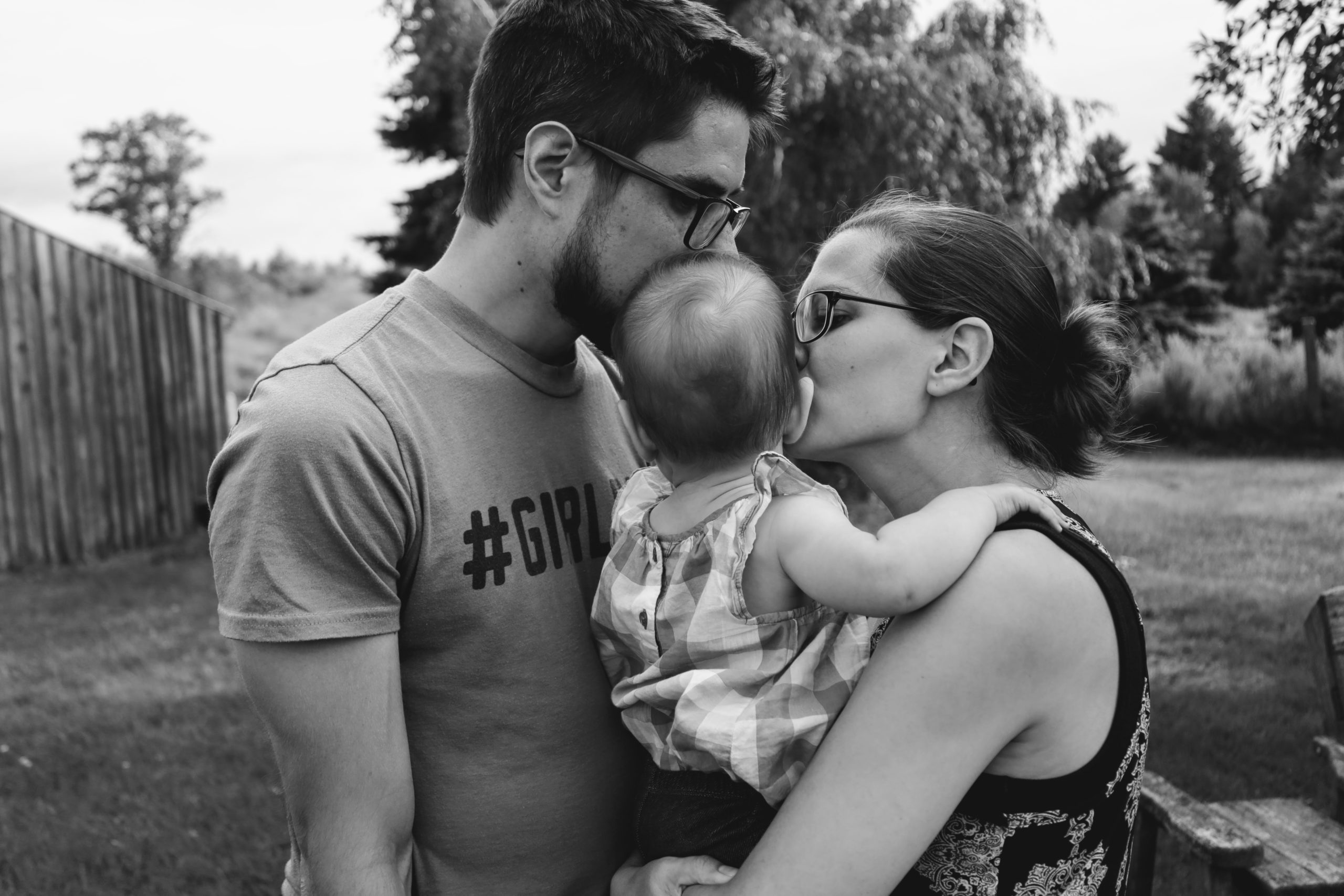For anyone who has experienced an extended inpatient hospital stay or who has had a loved one in that position knows that it is not an easy one to be in. In my experience, there are three things that need to be kept at the top of my to-do list in order to maintain some semblance of sanity through one of my husband’s inpatient stays.
God First
It might sound unfair to some or even callous. Put God first when your husband is sick in the hospital? I believe that God does ask us to put Him first, always. If He is not first everything else gets out of whack. That is even more so the case when a stressful situation is on the table.
The important thing to remember for me is that God loved Sean before I did. God loves him more than I currently do or ever will be able to. Sean is not mine, he is the Lord’s. God can take way better care of Sean than I can ever dream of being able to.
Sean is much better off in God’s hands than mine.
When I put God first it means that I am reaching out to Him. I am more able to give Sean’s health over to Him, instead of getting upset that I have absolutely NO control over the situation I can give it over to the One who has control and dominion over EVERYTHING.
Tips to Put God First
Find a Bible app. Bible is the Bible app I’ve been using for years. It’s actually the only app I’ve used to read the Bible until recently when I heard about Through the Word.
To put it simply the Bible app is like your standard Bible. You get to choose whatever translation you want to use while going through any number of Bible study-type courses. You don’t have to take the courses. They are just a nice feature of the app.
Through the Word, from what I can tell so far, is more like an in-depth study Bible that is read to you by different pastors. They are still in the more beginning stages of developing this app, but in my opinion, they are doing a nice job with it so far. Both are free so give them a shot!
Set a reminder. We all carry our phones around where ever we go. That truth doesn’t change during an emergency or stressful time. What can change are our habits. Sometimes that is out of necessity, but sometimes “necessity” should be assessed. With extended hospital stays, I have found that there is less time for even what is deemed necessary under normal circumstances let alone something that might feel like an extra during those times. To keep things in balance the Bible reading habit NEEDS to stay consistent. It’s like eating. You can go without it for a very short time, but once you do you quickly start to see the effects.
So my advice is to set a reminder on your phone to read your Bible every day. Even if it ends up being only one verse. A nice feature of the Bible app is that it offers the option of receiving a notification of the verse of the day, convenient for creating that habit and you will be surprised how often that random verse can be a source of encouragement and/or confirmation.
Putting God first puts everything else into its right perspective. That’s why, for me, God first is my first essential.
Self-Care Second
Now this one really does sound selfish on my part. Let me explain.
It never fails, at least once during a hospital stay Sean will ask me:
“What do you need right now?”
Unfortunately, sometimes I don’t know the answer or, maybe, rather it’s that I don’t like what I need. Such as going home and sleeping in my own bed, which would mean leaving my husband alone in the hospital.
In this instance, self-care refers to both myself and Sean. Both of us need to be aware of where we are physically, emotionally, and spiritually. This is not always as easy as it sounds. For me, I am already heightened emotionally because of said hospital stay and exhausted physically because I’m maintaining my work life and our home life while the other half of my personal life is living in the hospital. This means I need to put more effort into purposefully evaluating where I’m at versus just running off emotions.
Tips for Maintaining Self-Care
Take a few minutes in-between things like job and hospital to stop and breathe. That’s it, just: stop and breathe. It sounds obvious, but when Sean is in the hospital all I want is to be with him. It feels like I don’t have a single moment to stop and do anything; even to breathe.
Find ways to laugh together. This is most likely something you will both need. Right now Sean and I are watching through the entire series of Psych. It doesn’t get any better than that! You know that’s right!

They say laughter is the best medicine. I personally wouldn’t let it be the only thing in the first aid kit, BUT it can do wonders for mental and emotional health. It can be hard to determine when the right time for humor is, particularly when a medical situation is going on. Use your judgment and don’t be afraid to try and fail. Seriously (pun sort of intended), take mental notes of what works and what doesn’t and proceed with grace.
Sleep is key. If there’s one thing Sean and I have learned so far through this process it’s that as much as humanly possible we will BOTH get good full nights of sleep.
Getting the sleep you need during an inpatient stay is a tricky thing. For both the patient and the spouse. For the patient: headphones. Hospital noises are constant, especially in the emergency department but even if you have a private room. Machines are beeping and whirring, nurses are coming in and out, people talking in the hallway. Headphones are a good way to drown out some of that noise and also listen to some soothing music or anything else that will help you fall asleep. If not headphones then simple earplugs might suffice. Both are small and easy to carry around with you.
For the spouse or loved one of the patient sleep is just as important. Do what is necessary to get the sleep you need. If that means getting a hotel room (great for showering access too, btw) then, in my opinion, it’s money well spent. If finances are an issue (been there, pretty much still there) some hospitals have partnerships set up with local hotels. Shuttles are offered to transport you to the hotel, a discount on your nightly rate, food vouchers to be able to eat at the hotel, etc. Every little bit helps. Ask a nurse or social worker there at the hospital. They’ll hook you up and help find you a solution.
Support Third
Be there for each other. Let your spouse know that it’s ok for them to take care of themselves. Regardless if that means being the one in the hospital for a week or the one that needs to have some chocolate because the man you love is in the hospital for a week.
Whichever category you fall into, it’s ok.
Encourage each other with kind words and loads of affection. Hold each other when the situation is overwhelming and all you can do is sit and cry. Forgive each other if harsh words are spoken out of fear, frustration or simple sleep deprivation.
Remember, at the end of all this, the hospital stay will end and normal life will resume. Whatever your normal is while living with a chronic illness.
In the end, it will be ok. It’s trite, but it’s true.
Tips for Support
Communication. Find what works best for you both. If it’s texting then text each other while you’re sitting in the emergency department waiting for them to find you a room. If it’s Facebook Messenger then use that. If you have a routine at night before bed but you’re not together right before bedtime do what you can before one of you leaves the hospital.
Sean and I pray together every night. We should continue doing that even when he is in the hospital. If continuing that routine means calling each other on the phone to pray together before we go to sleep then that’s what we should do.
Social Support. It can be difficult to talk to people outside of the developing hospital situation. It takes precious time and energy. My advice, if you do nothing else, reach out to someone you trust that understands your situation and can be a listening ear for you to vent or to watch a show with you over Skype to help you de-escalate from the events of the day.
Supporting each other and making sure each of you has support outside of your relationship is crucial. It never feels like there is time for it in the moment, but believe me, if this aspect gets neglected it can have very negative consequences. I struggle with reaching out to others for support, so I know what the lack of support feels like and I only have myself to blame.
What are your essentials to survive hospital stress? Please, share in the comment section below.










0 Comments